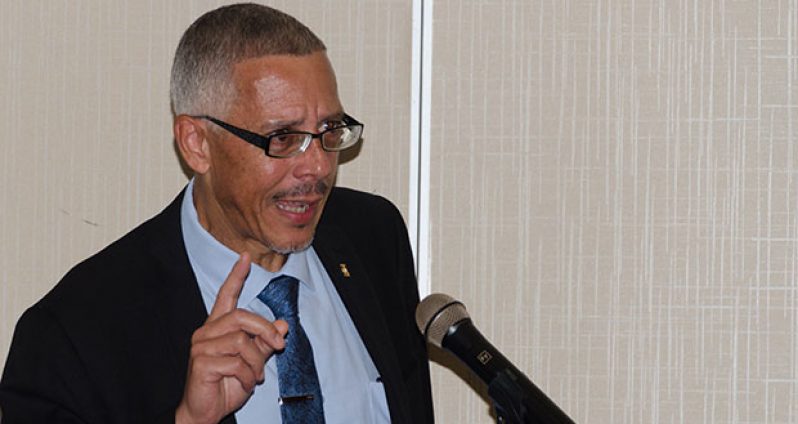By Svetlana Marshall
THE Private Sector Commission (PSC) has issued a call for the A Partnership for National Unity+Alliance for Change (APNU+AFC) Government to unveil its economic plan for the country, contending that little is being said at a time when the economy is growing slowly.Ramesh Persaud, an executive member of the Commission and immediate past president made the call on Thursday during the PSC’s Annual General Meeting held at the Marriott Hotel.
Present at the forum was Business Minister, Dominic Gaskin, members of the diplomatic corps and executives of the Commission, led by the outgoing Chairman Major General (Rtd), Norman Mclean.
In a detailed presentation on the state of the economy, Persaud said the country has experienced nine years of consecutive economic growth. The growth rate, however, is on the decline, he posited, pointing out that in 2015 the country’s economy grew by three per cent. This year, the economy is expected to grow by 4.4 per cent.
Though it grew in 2015, aggregate expenditure declined, he pointed out, explaining that overall Guyanese consumers and businesses spent approximately US$200 million or Guy$40 billion less in 2015 when compared to 2014.

In light of the decrease in aggregate expenditure and the decline of other sectors such as rice and sugar, Persaud said swift actions are needed to improve the economic landscape of the country.
Government, he emphasised, must share its economic vision and plan for the country, contending that “very little is known at this stage”.
Such a move, he explained, will help the Private Sector to have a better understanding of where the country is heading economically.
In addition to this key recommendation, Persaud said there is need for more engagements on the part of the Government and business community where investment ideas can be discussed.
Improving the Public Sector Investment Programme, and improving the efficiency and effectiveness of the Public Service were among other recommendations made to the Government.
But the Government cannot do it alone. The Private Sector, he said, needs to create some 25,000 jobs.
More on innovation and research
“We need to focus a little more on export led growth, we need to improve our competitiveness as companies, and focus on standards, on productivity, on the niche markets, we need to innovate more and spend more on research and development,” he added.
The Chairman, in his report, said the Private Sector wants an even greater role in transforming the physical and economical landscapes of the country, but continues to face serious challenges, especially in the area of electricity.
“After 50 years of nationhood, we cannot with all our water, river and other resources obtain cheap hydro-electricity. Every other country has one: Venezuela – Guru; Suriname –Afobaka; and Brazil – Itaipu; and others. We have the resources both human and physical resources and we can put them to work for us,” Mclean said.
“The Guyana dollar has depreciated to the point where it is now traded against the US dollar at about G$210-US$1,” he said, while noting that the economy is still very fragile, especially with the decline in productivity, and prices of sugar, rice, fish, bauxite and other commodities, which have been critical legs of the economy.
However, gold was stellar and continues to be in 2016, thanks to the contributions being made by Guyana Gold Fields and Troy Resources, which have moved on beyond commercial production. Oil, he stressed, will soon become a reality and play its part.
Notwithstanding the challenges, he noted that in 2016, the International Monetary Fund and the World Bank, all showed renewed interest in Guyana. “The International Monetary Fund has projected a GDP growth at four per cent but warned that we have to exercise control over wages and salaries,” the outgoing Chairman said.
MULTIPLE PLANTS
Minister Gaskin, in response to the concerns raise about the country’s inability to have hydro-power electricity in place, said it is very important for the country to have a multiplicity of hydropower plants, as against a single source which would have been the case had the previous Government move ahead with its Amaila Falls Hydro Power Project.
“It is very important that any solution that we apply is not reliant on a single source of electricity,” he posited.
As the country celebrates 50 years of Independence, he said the majority of Guyanese now have a fair idea of what they do not want.
“Guyanese generally want the same things for this country, better safety and security, better jobs and opportunities, better education and health care, better homes and communities, better infrastructure, better governance and above all more fairness and greater equity in the exploitation and distribution of our natural wealth,” Minister Gaskin stated.
Despite the challenges facing the nation, he said Guyanese should not be discouraged from achieving these common goals.
Acknowledging that the growth rate of the economy has slowed down in recent times, the Business Minister said the Government has the responsibility to provide the best possible condition for growth of the economy.
“We are responsible for the current state of our economy,” he stressed, noting that for far too long Guyana has been languishing at the bottom of the global competitiveness index and the World Bank index. As such, he said there is need for a joint effort on the part of the Government and Private Sector to improve the state of affairs.



.jpg)









